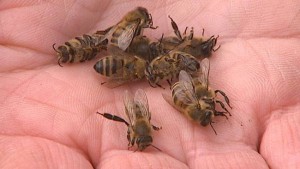In the spring, there is a cautious start to activity in the beehives. The first flights start for the bees to empty their intestines and start orienting themselves for food. Imagine what they have to endure!? It is a bit tricky to assess whether the feed reserves are sufficient or whether you should stock up on some extra emergency provisions. Holding the box up, assessing weight in addition to the weight of the box and the bees to feel if there is enough feed until nature's smorgasbord is served to them, is very tricky for me as a new beekeeper.
Sweeping out and cleaning from accumulated feces and dead bees is the next task; it hurts to see the piles of dead bees being cleaned out. And at the same time live with the knowledge that the bee communities need to be strong and resistant to the diseases that are becoming more and more common.
Since the end of World War II in 1945, the number of bees has halved. The reduction took place gradually until about six years ago, when entire bee colonies suddenly began to be wiped out. This is one of the reasons why I became a beekeeper.
However, I never cease to be amazed that the same bees that normally live about 3 weeks in the summer, can live almost 9 months during the winter.
I hope for many reasons that it will be an early and warm spring this year!

